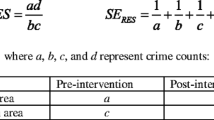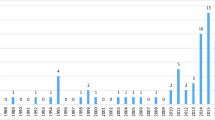Abstract
This paper examines issues concerned with police corruption and its control in England and Wales. The topic of defining police corruption is addressed, some current areas of risk are described and anti-corruption strategies, particularly those pursued by the London Metropolitan Police Service (MPS), are examined. What appears qualitatively and quantitatively different in the approach of services such as the MPS and Merseyside Police is the use of an adequately resourced, dedicated anti-corruption unit. This strategy has been buttressed by preventative measures involving management/administration and ethics/training. Dedicated units have been controversial, and preventative measures raise questions concerning evaluation. Nevertheless the approach to corruption bears comparison with that adopted by other major police services in other jurisdictions and represents a break with previous and unsuccessful efforts at corruption control in major police forces in England and Wales.
Similar content being viewed by others
References
ACPO, Corruption Prevention Strategy: Professional Standards in Policing (ACPO Presidential Taskforce on Corruption, 2001a), both quotes from 1.
ACPO, Policy for Professional Standards Reporting (ACPO Presidential Taskforce on Corruption, 2001b).
Ashworth, A., The Criminal Process: An evaluative study (Oxford: Oxford University Press, 1998); Newburn, 1998; Reiner, R., The Politics of the Police 3rd edn. (Oxford: Oxford University Press, 2000).
Becker, H., The Outsiders (New York: Free Press, 1963).
Bhaskar, R., Scientific Realism and Human Emancipation (London: Verso, 1986); Giddens, A., Central Problems in Social Theory (Macmillan: London, 1979), though for a critique see Vaughan, B., “Handle With Care: On the Use of Structuration Theory Within Criminology,” British Journal of Criminology 1999 (41), 185–200.
Carter, D., “Drug Related Corruption of Police Officers: A Contemporary Typology,” Journal of Criminal Justice, 1990 (18), 85–98.
Carter, H., “Police Gave Drugs for Confessions” The Guardian (UK) 13 February, 2001.
Chan, J., “Police Culture,” in D. Dixon (ed.) A Culture of Corruption (Hawkins: Australia, 1999), pp. 98–138.
Coaldrake, P., “Not Like the Good Old Days,” Australian Quarterly, 1988 (60:4), 408–411.
Criminal Justice Commission, Implementation of Reform within the Queensland Police Service: The Response of the Queensland Police Service to the Fitzgerald Inquiry Recommendations (Brisbane: Criminal Justice Commission, 1994); NYPD NYPD: Preventing Crime and Corruption (NYPD Corruption Prevention Publications, 2000).
Della Porta, D. and A. Vannucci, “The Resources of Corruption: some reflections from the Italian case”, Crime, Law and Social Change 1997 (27, 3–4), 231–254.
Dixon, D., “Issues in the Legal Regulation of Policing,” in D. Dixon (ed.) A Culture of Corruption (Hawkins: Australia, 1999), 45.
Doig, A., “Good Government and Sustainable Anti-Corruption Strategies: A Role for Independent Anti-Corruption Agencies?” Public Administration and Development 1995a (15:2), 151–165.
Doig, A., “Mixed Signals? Public Sector Change and the Proper Conduct of Public Business,” Public Administration 1995b (73), 191–212.
Doig, A., Corruption and Misconduct in Contemporary British Politics (Suffolk: Pelican, 1984), 232–252.
Doig, A. and J. Moran, “Anti-Corruption Agencies” in C. Fijnaut and L. Huberts (eds.) Corruption}, Integrity and Law Enforcement (Netherlands: Kluwer, 2002), 229–251.
Dombrink, J., “The Touchables: Vice and Police Corruption in the 1980s,” Law and Contemporary Problems 1988 (51:1), 201–232.
Dunnighan, C. and C. Norris, “The Detective, the Snout and the Audit Commission. The Real Costs of Using Informants,” Howard Journal of Criminal Justice, 1999 (38:1), 67–86.
Feeley, M. and J. Simon, “Actuarial Justice: the Emerging New Criminal Law,” in D. Nelken (ed.) The Futures of Criminology (London: Sage, 1994), 172–201.
Fielding, N., “Competence and Culture in the Police” Sociology 1988 (22:1), 45–64.
Finnane, M., “The Fitzgerald Commission: Law, Politics and State Corruption in Queensland” Australian Journal of Public Administration 1988, (XLVII: 4), 332.
Gillard, M. and L. Flynn, “MP Urges Straw to Stop Rot in Met” The Guardian (UK) 11 March, 2000a; N. Hopkins, “Police informer jailed for £400,000 swindle” The Guardian (UK) 4 April 2001.
Gillard, M., and L. Flynn, “Nine Years for Met Officer Turned Grass.” The Guardian (UK) 6 April 2000b.
Graef, R., Talking Blues (Harvill, 1989), 327.
Greenwood, J. and D. Wilson, Public Administration in Britain 2nd edn. (London: Unwin & Hyman, 1989), 141.
Hartley-Brewer, J., “Police held in drug case” The Guardian (UK) 25 September 1999.
Harvey, P. and R. Elias, “Heroin dealer admits corruption charge” Liverpool Echo 13 November 2000.
Hobbs, D., Doing the Business: Entrepreneurship Detectives and the Working Class in the East End of London (Oxford: Oxford University Press, 1988); Mark, R., In the Office of Constable (Glasgow: Fontana, 1979); Doig, A., Corruption and Misconduct in Contemporary British Politics (Suffolk: Pelican, 1984).
Hopkins, N., “Groovy Gang Drug Police Jailed,” The Guardian (UK) 5 August 2000b.
Hopkins, N., “Jail for Corrupt Detective Who Turned Informer,” The Guardian (UK) 5 February 2000a.
Kaptein, M. and P. van Reenen, “Integrity Management of Police Organisations”, Policing: An International Journal of Police Strategies and Management 2001 (24:3), 281–300.
Levi, M., “Covert Policing and the Investigation of Organised Fraud: The English Experience in International Context,” in C. Fijnaut and G. Marx, (eds.) Undercover Police Surveillance in Comparative Perspective (Hague: Kluwer, 1995), 195–212.
Manning, P. and Redlinger, J., “Invitational Edges of Corruption,” in P. Manning and J. van Maanen (eds.) Policing: A View from the Street (New York: Random House), 1977, 71-89.
McCoy, A., The Politics of Heroin in Southeast Asia (Singapore: Harper, 1972).
Moran, J., “The Changing Context of Corruption Control: the Hong Kong Special Administrative Region 1997–1999” Journal of Commonwealth and Comparative Politics 1999 (37:3), 98–116.
MPS, CIB3-The Anti-Corruption Squad (2001a) available at: http://www.met.police.uk/cib/cib3.htm,1.
MPS, The Corruption and Dishonesty Prevention Strategy (Metropolitan Police Service, 2001b) available at: http://www.met.police.uk/corruption/strategy/htm,3.
Newburn, T., “Understanding and preventing police corruption: Lessons from the literature.” Home Office Police Research Series Paper 1998 (No. 110).
Notton, J., “Ethical Issues Facing the City of London Police When Considering the Need to Form a Professional Standards Unit,” in M. Pagon (ed.) Policing in Central and Eastern Europe (Slovenia: College of Police Studies, 2000), 681.
O’Dowd, D., “No hiding place for corruption in the Metropolitan Police” paper presented to the ICAC Silver Jubilee Conference, Hong Kong, March, 1999a.
Osse, A., “Corruption prevention: A course for police officers fighting organised crime,” Crime, Law and Social Change 1997 (28), 53–71.
Reiser, E., “From Punishment to Education: Enhancing Integrity in the Australian Federal Police,” paper presented to the Workshop: Creating and Honest Police Force 10th International Anti-Corruption Conference, Prague, October 2001.
Rogerson, P., “Performance Measurement and Policing” Public Money and Management 1995 (October/December), 25–29.
Sechrest, D. and P. Burns, “Police Corruption: The Miami Case” Criminal Justice and Behaviour 1992 (19:3), 294–313; Bamber, D., “Failed Police Cadets Given A Second Chance” Daily Telegraph 4.8.2002.
Sellars, A., “Anti-Corruption Reform in the Metropolitan Police” paper presented to the Workshop: Creating and Honest Police Force 10th International Anti-Corruption Conference, Prague, October, 2001.
Sherman, L., Scandal and Reform. Controlling Police Corruption (Berkeley: University of California, 1978); Sechrest, D. and P. Burns, “Police Corruption: The Miami Case,” Criminal Justice and Behaviour 1992 (19:3), 294–313; Skolnick, J., “Corruption and the Blue Code of Silence” Police Practice and Research 2002 (3:1), 7.19.
Sherman, L.W., “Becoming Bent” in F. Elliston and M. Feldberg (eds.), Moral Issues in Police Work (Rowman and Littlefield, 1985), 253–265.
Thompson, I. and T. Thompson, “Arrests expected in 15 year old axe murder case.” Observer 29.9.2002; McLagan, G., “Journalists caught on tape in police bugging.” The Guardian (UK) 21.9.2002; Hughes, C., “Man arrested for brutal murder of private detective.” Western Mail 4 October 2002.
Waddington, D., “Police (Canteen) Subculture: An Appreciation.” British Journal of Criminology 1999 (39:2), 287.
Waddington, 1999, 290.
Weatherston, D., The Terrorist as Deviant: A critique of psychological and sociological theories of terrorism. (unpublished manuscript 2002).
Author information
Authors and Affiliations
Corresponding author
Rights and permissions
About this article
Cite this article
Moran, J. ‘Blue walls,’ ‘grey areas’ and ‘cleanups’: Issues in the control of police corruption in England and Wales. Crime Law Soc Change 43, 57–79 (2005). https://doi.org/10.1007/s10611-005-3003-1
Issue Date:
DOI: https://doi.org/10.1007/s10611-005-3003-1




